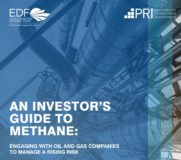
Bron
UN PRI
The PRI and the Environmental Defense Fund (EDF) have today released a new investor guide to support constructive dialogue with oil and gas companies around the world on methane emissions.
An investor’s guide to methane offers practical guidance on how to not only manage risks associated with methane emissions through company engagement, but identify opportunities as well. The guide provides a framework for investors designed to help them identify concrete next steps companies can take to improvement management, benchmark company performance and engage on methane risks. A quick reference guide provides the key points from the framework, as well as related engagement discussion questions.
Why does methane matter?
Methane emissions pose significant financial, reputational and regulatory risks for oil and gas industry investors. The oil and gas sector is the largest industry sources of methane today. Investor scrutiny on climate change risk is increasing and investors globally are becoming more concerned about the material risks that methane poses to portfolios.
Methane is 84 times more powerful than carbon dioxide over a 20-year period. As the primary component of natural gas, methane’s reputation as a transition fuel to a low carbon economy is jeopardised as the environmental benefits are eliminated when methane is emitted into the atmosphere. Such leakage can occur at various points of the natural gas supply chain – from production, transport and use. Companies that fail to appropriately manage methane may face additional regulatory and reputation risk, as policymakers and the energy consumers seek to avoid the high emissions resulting from methane leakage. Financially, if not captured and sold, methane is also a lost revenue source.
How can investors engage with oil and gas companies?
Using the framework laid out in the guide, investors can benchmark company performance and engage on methane. As part of their engagement, investors should expect all operators to measure, report and reduce their emissions:
- Measure – Getting accurate information on a company’s methane emissions is the first step to understanding the extent of the problem, uncovering hidden risks, and identifying opportunities to bring more product to the bottom line. The more accurate the information, the better positioned companies will be to effectively reduce emissions.
- Report – Investors require actionable methane information in order to understand the relative performance of operators, and leading companies will demonstrate how they are managing methane risk. Operators should set and disclose a methane reduction target, and report how they plan to meet that target.
- Reduce – Minimising methane emissions is highly cost effective, and can be done using proven, off the shelf technologies. Because methane is both pollutant and product, many of these technologies have a positive payback. Investors should feel confident in encouraging companies to reduce emissions knowing they can do so without affecting returns.
Read the guide here.






